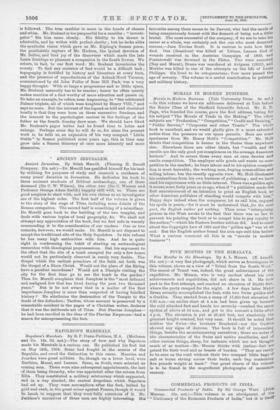ANCIENT JERUSALEM.
Ancient Jerusalem. By Solah Merrill. (Fleming H. Revell Company. 21s. not.)—Dr. Merrill has qualified himself for his task by utilising for purposes of study and research a. residence of many years' duration in Jerusalem. He dedicates his book to three eminent students of Biblical archaeology, one of them deceased (Sir C. W. Wilson), the other two (Sir C. Warren and Professor George Adam Smith) happily still with us. These are good auspices to start with, and his own claims as an investigator are of the highest order. The first half of the volume is given to the story of the siege of Titus, including some details of the Roman occupation. The second half is something of a miscellany. Dr. Morrill goes back to the building of the two temples, and deals with various topics of local geography, &a. We shall not attempt any appreciation of the book, but we feel safe in warmly commending it to the consideration of our readers. One or two remarks, however, wo would make. Dr. Merrill is not disposed to accept the traditional site of the Holy Sepulchre. In this refusal he has many high authorities with him. And he is quite right in condemning the habit of starting on archaeological researches with theological prepossessions. But his argument to the effect that the site of a tomb occupied for only a few hours would not be particularly observed is surely very feeble. The Gospel which the earliest preachers of the faith set forth was the Gospel of a Risen Christ. Would not the place of the Rising have a peculiar sacredness P Would not a Disciple visiting the city for the first time go to see the tomb in the garden P Then Dr. Merrill complains that Josephus is the "most defamed and maligned Jew that has lived during the past two thousand years." But is ho not aware that in a matter of the first importance Josephus is more than suspected of having falsified history P He attributes the destruction of the Temple to the feuds of the defenders ; Tacitns, whose account is preserved by a remarkable accident in the pages of a Christian writer, declares that it was the deliberate act of Titus. But Flavius Josephus- he had been enrolled in the Gene of the Flavian Emperors—had a reason for misrepresenting the fact.


























































 Previous page
Previous page